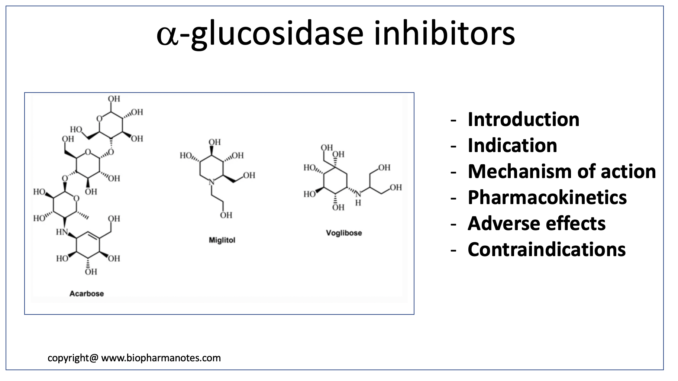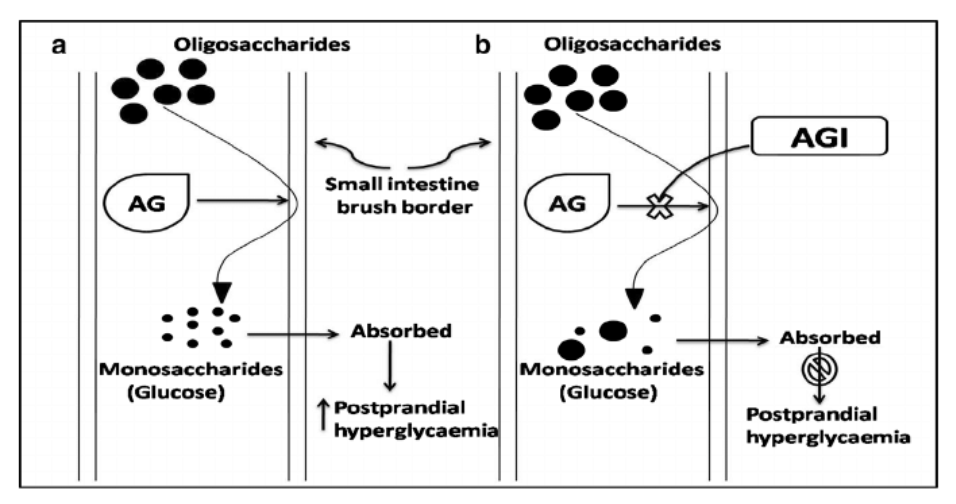
- alpha- glucosidase inhibitors are class of oral glucose-lowering agents used for treatment of type 2 diabetes. Some medications belonging to group of a-glucosidase inhibitors are acarbose, voglibose and miglitol. Among these three, acarbose is most commonly and widely studied.
- Acarbose and miglitol are FDA approved whereas voglibose is not FDA approved. Acarbose is pseudo carbohydrate derived from actinomycetes. Voglibose is also of microbial origin whereas miglitol is synthesized from 1- deoxynojirimycin.
Indications of alpha- glucosidase inhibitor
- Used in treatment of type 2 diabetes mellitus alone or in combination with other anti-diabetic agents. Used in adjunct with diet and exercise. They help to improve Hb A1c levels in severely hyperglycemic type 2 DM patients.
- They are also found useful in type 1 diabetes and gestational diabetes. However, they are not FDA-approved for these indications.
Mechanism of action of alpha-glucosidase inhibitor

Figure – Mechanism of action of alpha-glucosidase inhibitors
- Foods containing carbohydrates are broken down by digestive system to glucose, which can be easily absorbed into bloodstream. a-glucosidase enzymes are located in intestinal brush border and are involved in breaking down of carbohydrates into glucose and other simple type of sugars. a-glucosidase inhibitors like acarbose and miglitol, when taken before meal, binds to carbohydrate binding sites inhibit these enzymes. These results in delayed digestion of carbohydrates like starch, dextrin and disaccharides and lower post prandial glucose level.
- Compared to natural oligosaccharides, acarbose has 104 – 105 times more affinity for alpha glucosidase.
- Some a-glucosidase inhibitors like acarbose and miglitol also inhibit sucrase and glucoamylase and weakly inhibit pancreatic a- amylase. They don’t inhibit absorption of glucose as they don’t interfere with intestinal sodium dependent glucose transporter.
Pharmacokinetics of alpha-glucosidase inhibitors
- All of them are administered via oral route. They are administered three times a day with the first bite of each meal. They are started with lower dose.
- Acarbose and voglibose are poorly absorbed from gut and have low bioavailability. They are excreted via fecal route. Miglitol is completely absorbed from gut, doesn’t have systemic effect and is excreted unchanged via renal route.
Adverse effects
- Some common side effects include flatulence, loose stools, and abdominal discomfort. These are caused due to degradation of undigested carbohydrates by bacteria in colon and eating carbohydrate rich foods may increase severity of GI effects. Flatulence occurs in around 75% of cases.
- They can also cause hepatitis and elevation of hepatic enzymes.
- Unlike other oral hypoglycemic agents, these drugs when used as monotherapy don’t cause hypoglycemia as they don’t stimulate insulin release or increase insulin sensitivity. However, when combined with insulin or insulin secretagogue like sulfonylurea, they may cause hypoglycemia. As these drugs inhibit sucrase, such hypoglycemic conditions should be treated with glucose and not with sucrose.
Contraindications
- Contraindicated in patients with chronic intestinal disease including intestinal obstruction, colonic ulceration and IBD (inflammatory bowel disease).
- Contraindicated in patients allergic to a-glucosidase inhibitors.
- They are also contraindicated in diabetic ketoacidosis
- Their safety in pediatric and pregnant women has not been established.
References
- https://www.ncbi.nlm.nih.gov/books/NBK557848/
- https://go.drugbank.com/drugs/DB00284
- DiNicolantonio JJ etal. Acarbose: safe and effective for lowering postprandial hyperglycaemia and improving cardiovascular outcomes. Open Heart. 2015; 2(1): e000327.
- Dirir Am etal. A review of alpha-glucosidase inhibitors from plants as potential candidates for the treatment of type-2 diabetes. Phytochemistry Reviews (2021)
- Goodman and Gillman Manual of Pharmacology and Therapeutics.
- Lippincott Illustrated Reviews Pharmacology, 6th edition.